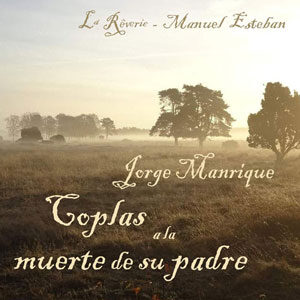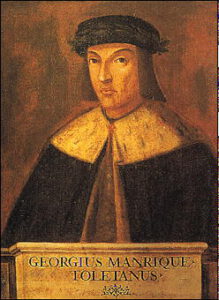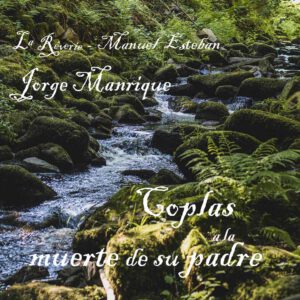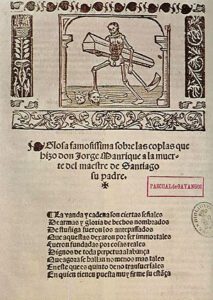Coplas a la muerte de su padre
Stanzas about the Death of his Father
Manuel Esteban (composer) · Jorge Manrique (poem)

«Coplas a la muerte de su padre · Verses on the death of Don Rodrigo Manrique, his Father» is a composition by Manuel Esteban on the famous coplas of Jorge Manrique (1440-1479).
It is a two-voice counterpoint performed by the ensemble La Rêverie – Cántica, founded by Manuel Esteban himself and with which he often gives concerts.
The work tries to follow in the footsteps of the Spanish polyphonists of the 15th and 16th centuries, although elements of the present time inevitably arise.
The video was recorded in the Alpujarra of Granada, in the village of Cáñar, in June 2021.
Performers: La Rêverie – Cántica
Yolanda Campos: voice (mezzo-soprano)
Inmaculada Gómez: transverse flute
Listen to the work on Spotify:
Watch and listen to the video recorded in the Alpujarra of Granada:
The present take of the «Coplas a la muerte de su padre«,
interpreted by the artists of Cántica
Inma Gómez (flute) and Yolanda Campos (singing),
was recorded in the village of Cáñar (Alpujarras, Granada), in June 2021.
Technicians: Juan Borrás, video; Manuel Esteban, audio.
The lyrics of the song, by Jorge Manrique
Jorge Manrique (c. 1440 – 24 April 1479) was a major Castilian poet, whose main work, the Coplas por la muerte de su padre (Verses on the death of Don Rodrigo Manrique, his Father), is still read today.
More a military man than a poet, he was a supporter of the queen Isabel I of Castile, and actively participated on her side in the civil war that broke out against her half-brother, Enrique IV. He died at the end of the campaign.

I
Recuerde el alma dormida,
avive el seso y despierte
contemplando
cómo se pasa la vida,
cómo se viene la muerte
tan callando,
cuán presto se va el placer,
cómo, después de acordado,
da dolor;
cómo, a nuestro parecer,
cualquiera tiempo pasado
fue mejor.

III
Nuestras vidas son los ríos
que van a dar en la mar,
que es el morir,
allí van los señoríos
derechos a se acabar
y consumir;
allí los ríos caudales,
allí los otros medianos
y más chicos,
y llegados, son iguales
los que viven por sus manos
y los ricos.

V
Este mundo es el camino
para el otro, que es morada
sin pesar;
mas cumple tener buen tino
para andar esta jornada
sin errar.
Partimos cuando nacemos
andamos mientras vivimos,
y llegamos
al tiempo que fenecemos;
así que cuando morimos
descansamos.
English translation (by Henry Wadsworth Longfellow)
I
O let the soul her slumbers break,
Let thought be quickened, and awake;
Awake to see
How soon this life is past and gone,
And death comes softly stealing on,
How silently!
Swiftly our pleasures glide away,
Our hearts recall the distant day
the pain
The moments that are speeding fast
We heed not, but the past,—the past,
More highly prize.
III
Our lives are rivers, gliding free
To that unfathomed, boundless sea,
The silent grave!
Thither all earthly pomp and boast
Roll, to be swallowed up and lost
In one dark wave.
Thither the mighty torrents stray,
Thither the brook pursues its way,
And tinkling rill,
There all are equal; side by side
The poor man and the son of pride
Lie calm and still.
The original poem is composed of 40 couplets, of which this version presents three of the first. Find the complete lyrics of the poem at cervantesvirtual.com







